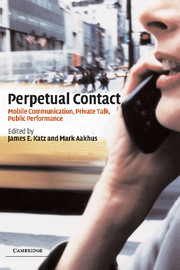Book contents
- Frontmatter
- Contents
- List of figures
- List of tables
- Notes on the contributors
- Preface and acknowledgments
- 1 Introduction: framing the issues
- PART I Mobile communication: national and comparative perspectives
- 2 Finland: a mobile culture
- 3 Israel: chutzpah and chatter in the Holy Land
- 4 Italy: stereotypes, true and false
- 5 Korea: personal meanings
- 6 United States: popular, pragmatic and problematic
- 7 France: preserving the image
- 8 The Netherlands and the USA compared
- 9 Bulgaria: mobile phones as post-communist cultural icons
- PART II Private talk: interpersonal relations and micro-behavior
- PART III Public performance: social groups and structures
- Appendixes
- Index
9 - Bulgaria: mobile phones as post-communist cultural icons
Published online by Cambridge University Press: 22 September 2009
- Frontmatter
- Contents
- List of figures
- List of tables
- Notes on the contributors
- Preface and acknowledgments
- 1 Introduction: framing the issues
- PART I Mobile communication: national and comparative perspectives
- 2 Finland: a mobile culture
- 3 Israel: chutzpah and chatter in the Holy Land
- 4 Italy: stereotypes, true and false
- 5 Korea: personal meanings
- 6 United States: popular, pragmatic and problematic
- 7 France: preserving the image
- 8 The Netherlands and the USA compared
- 9 Bulgaria: mobile phones as post-communist cultural icons
- PART II Private talk: interpersonal relations and micro-behavior
- PART III Public performance: social groups and structures
- Appendixes
- Index
Summary
Can a nation's cell phone usage convey an accurate cultural image, in this case of a post-communist East European nation? I think so. Understanding how citizens embrace this technology can provide insight into the broader cultural configuration of a country that only recently emerged from a reality in which both its culture and its technology were directed by an often-corrupt centralized authority (that is, a communist government).
My purpose is to describe this landscape: a study of technology and culture in a poor and, until recently, oppressed nation. I am not testing any hypotheses or engaging in high-level theorizing. Rather, I have searched the newspaper archives, spoken to cell phone users, observed my fellow citizens and listened to the voices of children, young adults and seniors. I am using the mobile phone as a lens through which to view my culture. I also hope to provide an interesting snapshot that can be compared with the other nations portrayed in this volume.
Bulgaria is a poor country materially, but a generation of ambitious young people is eager to embrace what, for tradition-bound Bulgaria, are truly foreign ways. My culture will be modified as these people explore mobile phone technology, the seeming epitome of all that Western civilization can provide, the embodiment of the American society they have come to know from watching Western movies.
Bulgaria, a nation of 9 million people, was a loyal communist satellite of Russia for forty-five years.
- Type
- Chapter
- Information
- Perpetual ContactMobile Communication, Private Talk, Public Performance, pp. 126 - 136Publisher: Cambridge University PressPrint publication year: 2002
- 5
- Cited by



